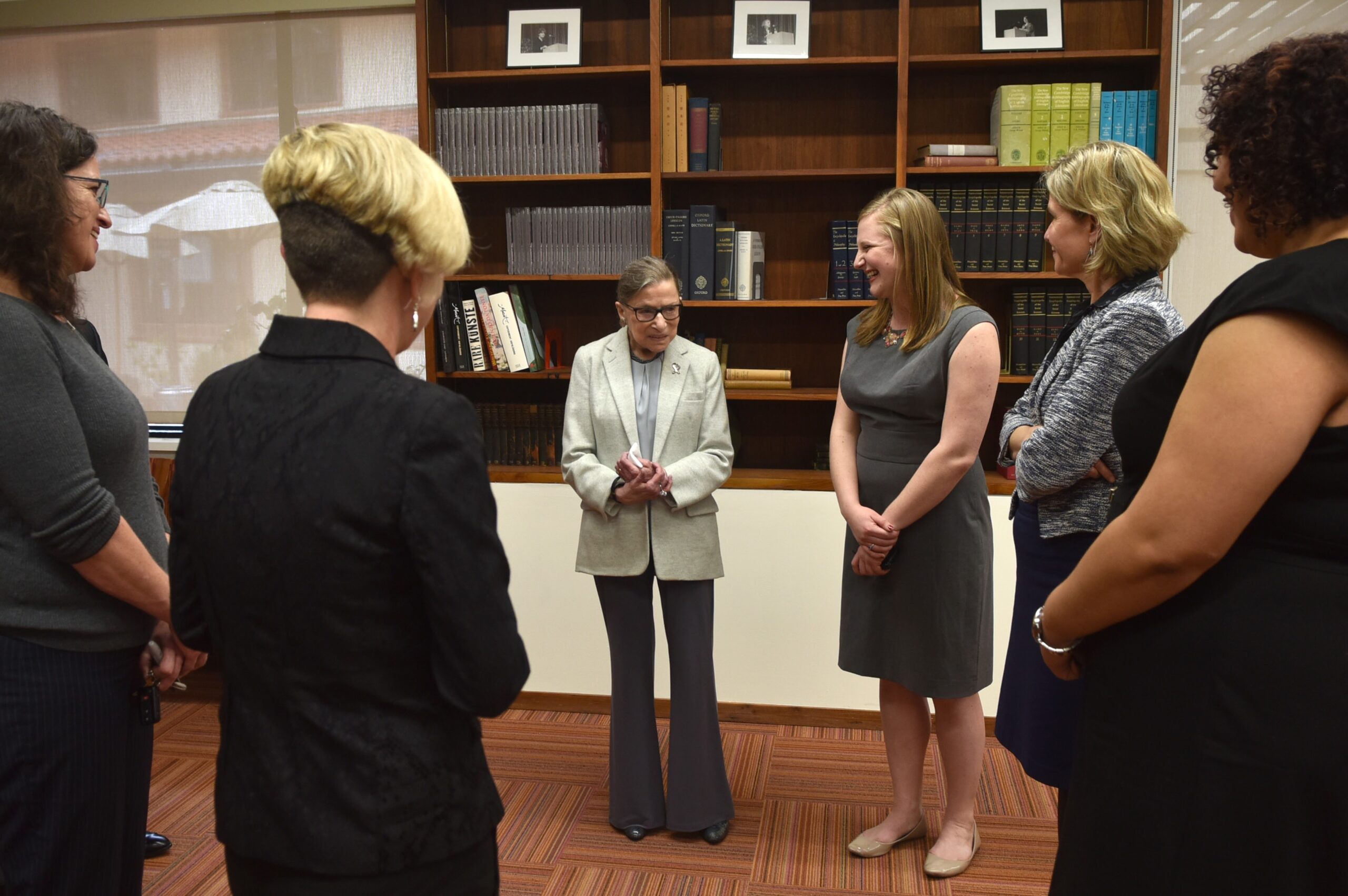Photo Credit: Marta Hanson
Four years ago, I met my hero. U.S. Supreme Court Justice Ruth Bader Ginsburg visited Stanford to give the Rathbun Lecture on a Meaningful Life, and as associate director of the Stanford Women’s Community Center, I organized an intimate conversation for students to meet her.
When Justice Ginsburg arrived, I shook her lace-gloved hand and escorted her inside. She placed her “I dissent” tote bag by her chair and settled in. I pinched myself, elated, to be sure I wasn’t dreaming.
You see, my childhood dream was to be a U.S. Supreme Court Justice—the first woman chief justice, to be exact.
My pursuit of justice started young. In fifth grade, I was the umpire for class kickball games, my commitment to fairness ensuring equal justice under schoolyard law. In tenth grade, I wrote a term paper on the 50th anniversary of Brown v. Board of Education analyzing the decision to overturn an unjust law and its impact on the civil rights movement. I, too, wanted to make decisions to help people. Stubborn oldest child that I was, I didn’t want to be just any judge—I wanted to have the final say, because I trusted my sense of right and wrong. I wanted to serve on the highest court in the land.
My career aspirations changed in college. I remember taking a class co-taught by Stanford law professor Pam Karlan, rumored to be on President Obama’s Supreme Court nomination shortlist. She explained that she had no chance of being selected: she had decided years earlier to advocate vocally for pressing legal issues—including gay rights and criminal justice—rather than stay silent on the off-chance that political stars aligned for one of nine coveted spots. She had a point.
I decided to pursue justice vocally.
Though my path has led me to HKS rather than to law school, I still love the Supreme Court. I admire every woman who has served: Sandra Day O’Connor for her trailblazing tenacity, Elena Kagan for her brilliant writing, Sonia Sotomayor for giving weight to both lived experience and legal precedent in her blistering dissents. Ruth Bader Ginsburg, though, has always held a special place in my heart. Courageous, relentless, unflappable—exactly what I aspire to.
In fact, I’m what you might call an RBG fangirl. I’ve been gifted RBG socks, an RBG mug, the RBG workout book. My leopard-print blouse that, if you look closely, is actually tiny RBG faces, is my favorite purchase of the past year. Channeling her spirit has always brought me energy and hope.
Hearing her speak was even better.
Justice Ginsburg spoke about her nightmares of the Holocaust as a Jewish girl growing up in Brooklyn; about managing the law school course loads for both herself and her husband as he battled cancer and they had a toddler; about her inability to find work as a young lawyer and the gender-based barriers she strategically dismantled throughout her career.
During the Q&A, a student asked how she’d managed to persevere in the face of what seemed impossible, time and time again.
“Stop worrying,” Justice Ginsburg replied, her quiet voice full of certainty, “and find a way.”
Today, so much of what we’re facing seems impossible—political polarization, a president who eschews democratic norms, human rights abuses at home and around the globe, climate change. Amidst this year’s global pandemic, we have each, in our own way, become more intimately acquainted (or reacquainted) with grief: the messy cycle of shock, denial, anger, bargaining, and acceptance is a constant companion as we shift our expectations of school, work, relationships, and future plans.
A leading scholar on grief, David Kessler, recently introduced a sixth stage: finding meaning. When the worst happens, what do we do about it?
When things feel impossible, how do we move forward?
When I heard the news of Justice Ginsburg’s death, my heart lurched to my throat. I couldn’t stop shaking. Not only had my icon passed, but the political implications for our democracy—and the personal rights at stake to abortion, marriage, voting, healthcare, safety, and more—felt downright impossible.
What do we do when something seems impossible? I asked myself that night, despairing.
Scrolling through my Twitter feed, my eyes fell on words from Alexandria Ocasio-Cortez: We must grow in courage, strength, and strategy.
How do we stop worrying and find a way? I wondered.
Remember: hope is a discipline, urged Brittany Packnett Cunningham.
What meaning will come from this grief?
A blessing from Amanda Litman, and an invitation: May her memory be a revolution.
Justice Ginsburg may be gone, but generations of women carry on her legacy. Our call is clear, at HKS and beyond: activate, organize, vote like our country depends on it. Ruth-less, yet ruthlessly—for justice, rights, community, freedom. Together.
I’ll be the one in the leopard-print blouse.
